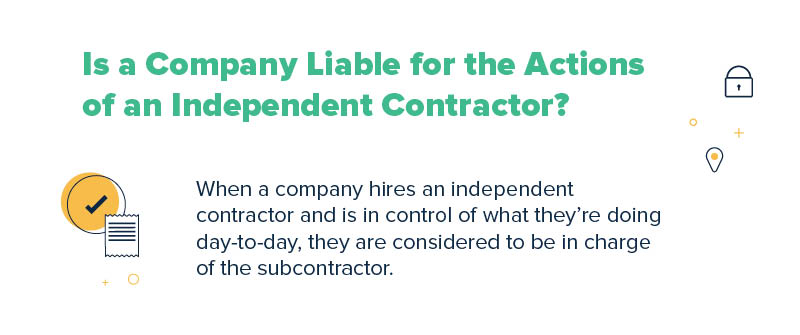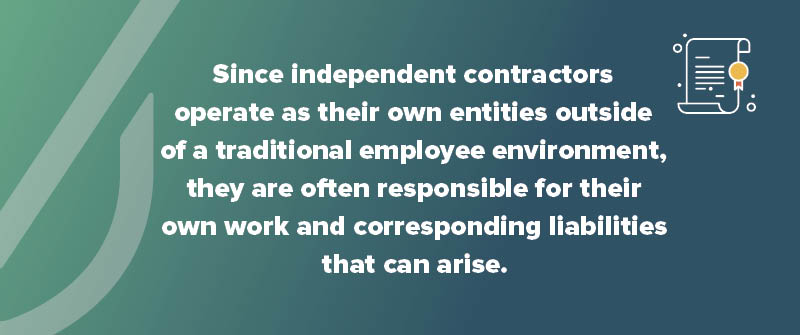
With any number of accidents and pitfalls looming around worksites, it is imperative for contractors to have insurance that protects them on their jobs.
The types and levels of coverage they obtain are up to them, but for many reasons, it is a best practice for independent contractors to carry insurance so that they do not end up in a situation where they are injured, hurt someone else, damage a property, do an unsatisfactory or negligent job, or face other common scenarios in contracting, without protection.
For example, let’s say that a subcontractor you have hired accidentally causes damage to a neighboring property while working on your job. If they don’t have the necessary insurance coverage to pay for the damages, the neighboring property owner is likely to file suit against you instead. Since you hired them, laid out their scope of work, and were ultimately responsible for the job being done, your business may have to take the financial fall.
In this blog, we’ll explore the cruciality of contractors carrying insurance protection and the consequences that can occur – for you and for them – when they do not.
Is It Important for a Contractor to Have Insurance?
Hiring contractors with proper insurance protection is an important business strategy for anyone who wishes to reduce the likelihood of future litigation and liability. As a smart business practice, you’ll want to protect yourself from the risk associated with bringing each new hire onto a job.
For example, if a hired contractor or subcontractor without workers’ compensation insurance gets injured while doing a project for you, you could be held responsible for your medical bills and lost wages. Even if they injure someone else while on the job, if they don’t hold contractors’ general liability insurance, again, you could be held responsible.
When contractors have an insurance policy anticipating the claim that occurred, they protect themselves and you as their hiring party from being held financially liable for it. It is good business practice and it’s good to construction risk management.

Do Contractors Need Insurance?
In order to be considered professional and legitimate, contractors must carry insurance. Most that you meet will have some form of liability insurance and workers’ comp, either through state-mandated licensing requirements for their trade or from previous client expectations. Additionally, in many jurisdictions, laws are in place that require contractors to carry certain types of insurance, so it is important to comply with them or else it could result in fines and other penalties for them.
Contractors who do not obtain coverage show prospective clients a lack of commitment to safety and open themselves up to potentially financially devastating situations in their line of work. Therefore, independent contractor insurance requirements are fairly common throughout the industry, and we recommend including a contractual provision making proper insurance protection a condition of hiring any new worker.
Is a Company Liable for the Actions of an Independent Contractor?
When a company hires an independent contractor and is in control of what they’re doing day-to-day, they are considered to be in charge of the subcontractor. If they fail to supervise the contractor, resulting in injuries, accidents, or damages, the subcontractor may choose to file a claim against them, meaning you’d be on the hook for their financial ramifications.
There are some cases where, when an independent contractor is truly autonomous in their work, a hiring company might not be held liable for a worker’s actions. Either way, it is smart of companies to establish insurance verification standards for every independent contractor they hire to mitigate those workers’ associated levels of risk.

What Is Independent Contractors’ Coverage?
Independent contractors’ coverage refers to insurance policies frequently purchased by contractors from an insurance company, such as general liability insurance and workers’ compensation. These are policies designed to protect independent contractors from various risks that could come along with their sometimes dangerous line of work. Other common types of coverage independent contractors often obtain include a general liability insurance policy, business property insurance, and commercial auto insurance.
What Is the Liability of an Independent Contractor?
Since independent contractors operate as their own entities outside of a traditional employee environment, they are often responsible for their own work and corresponding liabilities that can arise. Of course, it depends on the nature of their work and the contracts they sign, as well as if they are actually able to pay for expenses if incurred out-of-pocket. Here are a few examples of things independent contractors could be held liable for:
- Breach of contract. If they do not deliver the agreed-upon services according to the terms laid out in their independent contractor agreement.
- Negligence. If the job done is not up to par and causes property damage or third-party injury.
- Statutory compliance. If they do not comply with the laws and regulations governing their industry, such as holding certain permits.

Verify and Maintain Contractor Coverage With myCOI
In conclusion, it’s extremely important for contractors to carry appropriate insurance coverage so that they aren’t held financially responsible for damages they can cause – and neither are you.
Help your contractors maintain their statutory compliance and protect both themselves and your business from claims and expensive out-of-pocket payouts. You can verify your contractors’ coverage by requesting certificates of insurance, or COIS, documents from their insurer that provide proof of their current coverage.
Want to learn more about managing third-party compliance? Book a demo with us today.